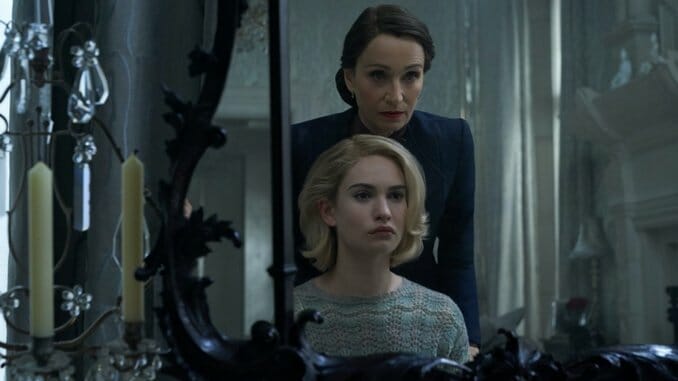The best and sexiest sex anyone has in Ben Wheatley’s adaptation of Rebecca, the 1938 Daphne du Maurier tome adapted into a stone-cold cinematic masterpiece by Alfred Hitchcock in 1940, is on a Monte Carlo beach under 20 minutes into the film. The story’s nameless protagonist (Lily James) lies face-down on a beach bed, her back exposed by her halterneck to the exploratory fingers of her crush, Maxim de Winter (Armie Hammer), who occupies himself dusting tiny mounds of sand over her shoulder blades. “Imagine if you could bottle a memory like scent,” she purrs. “Then, whenever you wanted, you could open it. It’d be like living the moment all over again.”
Maxim gently shapes another micro dune on her skin. She inhales, quickly and quietly, her eyes gliding shut like bedroom shades. It’s subtle. It’s hot. It’s the apex of the film’s assertive sensuality, and both of the stars have their clothes on. Worse, there’s much more movie left to get through and nary a trace of eroticism elsewhere in this tale of the spectral baggage people carry from old relationships into new ones. Wheatley, wielding a script composed by Jane Goldman, Joe Shrapnel and Anna Waterhouse, doesn’t build off of that subtle, effectively tantalizing beach scene, nor does he relive the moment in keeping with the future Mrs. de Winter’s imagination. Instead, Rebecca trundles in dutiful lockstep with the novel, as if relieved to not explore the messiness of carnal hunger in further depth.
James’ heroine begins the film as companion to an obnoxious social-climbing ogre (Ann Dowd) who winds up feasting on her own smug contempt when Maxim takes an instant liking to the guileless innominate young woman and sweeps her off her feet. Drenched in the wealth and sunshine, she falls in love. Together, they beat a hasty retreat away from one exotic European location, marry, honeymoon off-screen to several other exotic European locations, and end up on the cliffs of Cornwall at Maxim’s ancestral home, the mansion called Manderley. Rebecca, his first wife, who died in a boating accident (or did she), haunts Manderley’s halls with her memory, reinforced at every chance by housekeeper and career battleaxe Mrs. Danvers (Kristin Scott Thomas). Danvers loved Rebecca. She still loves Rebecca. She maintains Rebecca’s grand old bedroom in perfect condition and works tirelessly to undermine the second Mrs. de Winter’s confidence in her place in both Manderley and Maxim’s heart.
Scott Thomas makes the most of her role here, acting with aloof precision befitting the character’s mien. She’s a true menace, so chilling even when merely observing that the temperature of her every scene drops by degrees. In a way she has the least to work with in making Danvers feel human: Danvers is a woman composed solely of obsession, and obsession isn’t much of a personality. Scott Thomas gives Danvers personality, brutal though it may be. Hammer and James don’t fare quite so well, though James does better than her American co-star. She has charm and innocence, a strong jawline that either betrays her vulnerability or proclaims her determination for her. By contrast, Hammer is named after the bluntest instrument a man has in his toolbox, and he acts accordingly. He’s unsupple instead of graceful, clumsily tactile, saved but not exactly availed by his good looks. In nearly every scene, he stands perplexed as if looking for a nail to clobber.
The interplay Wheatley conducts between James and Scott Thomas is a good deal more interesting, and in a pruned-down, focused version of the screenplay, the tension and dominance between these two women could have augmented the lust that defines the narrative from the outset. Given the extremity of emotion Wheatley typically squeezes out of his best work—the savagery of Kill List, the madness of A Field in England, the despair of High Rise—Rebecca’s comparatively staid quality feels puzzling. The emotions at play here are among the highest any person can endure, particularly together, as grief and horniness tend to mix about the same as matches and kerosene. Save for when, for instance, Danvers attempts to coax Mrs. de Winter out of a window, Rebecca remains in neutral gear.
Is this unfair to Wheatley? Is he fighting a losing battle given that Hitchcock already retold this story, and arguably better than du Maurier? Rebecca should stand on its own, but Wheatley does so little to play with the source after that steamy first quarter that the viewer likely won’t discover on a reason to adapt the material anew. The film only gets as far as the beach, and James’ breathy line readings, and Scott Thomas’ icy supporting performance. It never bothers undressing.
Director: Ben Wheatley
Writers: Jane Goldman, Joe Shrapnel, Anna Waterhouse
Starring: Lily James, Armie Hammer, Kristin Scott Thomas, Ben Crompton, Tom Goodman-Hill, Sam Riley, Ann Dowd
Release Date: October 16, 2020 (theaters); October 21, 2020 (Netflix)
Bostonian culture journalist Andy Crump covers the movies, beer, music, and being a dad for way too many outlets, perhaps even yours. He has contributed to Paste since 2013. You can follow him on Twitter and find his collected work at his personal blog. He’s composed of roughly 65% craft beer.
